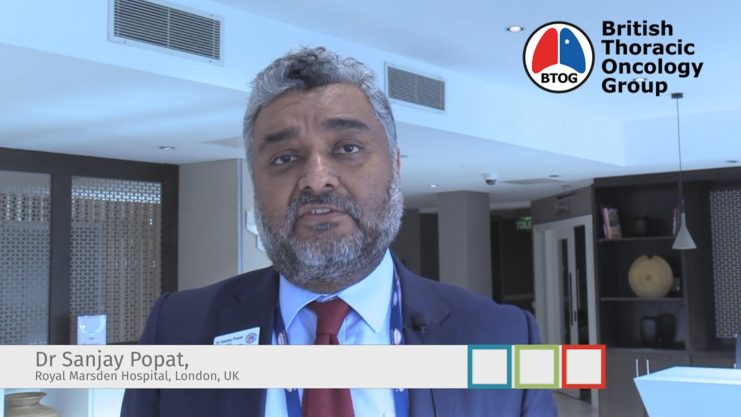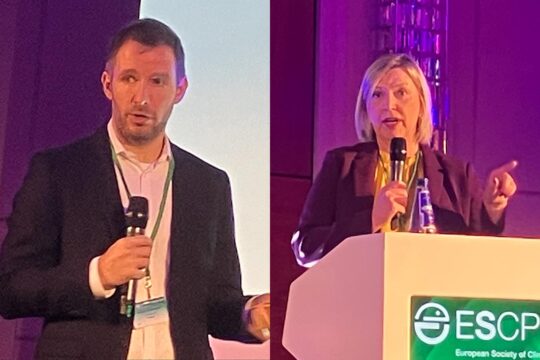Advertisment
Mesothelioma trials update

Dr Popat gives an update of the ongoing studies in mesothelioma in the UK
Interview by Esther Drain. Article by Christine Clark.
Currently there are seven ongoing UK trials for malignant pleural mesothelioma (MPM), seven recently completed trials, ten international trials of immunotherapy (IO), and four upcoming UK trials.
Atomic-meso presented by Professor Peter Szlosarek (Professor of Medical Oncology, St Bartholomew’s Hospital, London, UK). Some MPMs are dependent on extracellular arginine for growth because they lack the enzyme argininosuccinate synthetase 1 (ASS1). Arginine-deprivation is a logical treatment approach to treatment and this can be achieved using pegylated arginine deiminase (ADI-PEG 20), an arginine-depleting enzyme. The observation that removal of arginine sensitised tumours to pemetrexed provided basis for the TRAP trial (Phase I) and then the ATOMIC-meso trial (Phase 2/3). In this trial patients with non-epithelioid MPM are randomised to pemetrexed + cisplatin + ADI-PEG20 or pemetrexed + cisplatin +placebo. ADI-PEG20 (or placebo) is given by injection once a week. So far 100 patients have been recruited. One trial participant has experienced a 70% reduction in tumour mass after 15 months, said Professor Szlosarek.
MARS2 presented by Professor Eric Lim (Consultant Thoracic Surgeon, Royal Brompton Hospital, UK). MARS2 is now the largest surgical study in MPM so far. It has been designed to test the hypothesis that extended pleurectomy decortication and chemotherapy is superior (30% relative improvement) to chemotherapy alone with respect to overall survival. Patients with tissue-confirmed MPM in one hemithorax who have already had two cycles of platinum and pemetrexed with resectable disease are randomised to undergo extended pleurectomy decortication followed by four cycles of platinum + pemetrexed or four cycles of platinum + pemetrexed with no surgery. The trial is on target to complete recruitment of 326 participants in 2020, said Professor Lim.
MESOTRAP presented by Dr Robert Rintoul (Royal Papworth Hospital, Cambridge, UK) is a feasibility study to compare video-assisted thoracoscopic partial pleurectomy/decortication (VAT-PD) with an indwelling pleural catheter (IPC) for trapped lung in pleural mesothelioma. Trapped lung is a significant cause of morbidity in MPM. It presents as repeated cycles of breathlessness due to fluid accumulation, drainage and re-accumulation. The aim of treatment is to get the lung reinflated and to prevent re-accumulation of fluid by means of pleurodesis. The trial requires 36 patients with MPM and trapped lung who are fit enough to undergo VAT-DP. So far, 633 patients have been screened and nine have been randomised. Only 14% of screened patients have trapped lung, a lower proportion than was expected, said Dr Rintoul. More patients are needed to complete the trial.
CONFIRM presented by Professor Dean Fennell (Consultant in Thoracic Medical Oncology, University Hospitals, Leicester, UK) is a phase III trial to evaluate the impact of anti-PD1 immunotherapy with nivolumab in patients with MPM who have already had first- and second-line therapy. Professor Fennell noted that in August 2018 nivolumab (Opdivo) was approved in Japan for unresectable, advanced or recurrent MPM which has progressed after chemotherapy. This study also includes integrated correlative studies designed to increase understanding of the mechanisms of exceptional responses and acquired resistance to immunotherapy. These include genome-wide somatic copy number alteration (SCNA) analysis, transcriptome and tumour microenvironment (TME) analysis, 16sRNA sequencing of the gastro intestinal tract microbiome and PD-L1 stratification. It is already known that the deletion of interferon genes (9p21) confers resistance to immunotherapy, he commented.
MiST – Mesothelioma Stratified Therapy (NCT 03654833) presented by Professor Dean Fennell. Mesothelioma subtypes exhibit distinct genomic patterns. BRCA1-associated protein 1(BAP1) is the most-frequently mutated gene in MPM; about 25% of patients will carry the BAP1 mutated gene. Loss of BAP1 inhibits homologous recombination which is critical for effective DNA repair. For this trial patients with inoperable mesothelioma following line therapy, undergo molecular pre-screening and then, according to the results, are entered into one of four treatment groups. For example, those who are found to be BRCA1/BAP1 negative will be treated with rucaparib, a PARP-inhibitor. Comprehensive genomic analysis will also be undertaken.
BEAT- meso presented by Dr Sanjay Popat (Consultant Medical Oncologist, Royal Marsden Hospital, London, UK). Is a randomised phase III trial designed to assess the effect of adding atezolizumab to standard of care (carboplatin + pemetrexed + bevacizumab), as first-line treatment of advanced MPM. This trial started in December 2018 and will require 320 patients. The DREAM trial tested the effect of frontline chemotherapy (cisplatin + pemetrexed) combined with IO (durvalumab) in a single arm study. The results so far show a median PFS of 6.2 months (95% CI: 5.5 – 9.0), noted Dr Popat.
In addition to the trials described above, several other notable trials are planned. One is a trial using combination of checkpoint inhibition and arginine depletion. In mouse models the combination has proved to restrict tumour volume much more effectively than either drug alone. Another is a randomised study of methadone compared with the standard of care for pain control. Methadone offers the benefit of opioid activity and antagonism of the NMDA receptor and one study has shown that methadone is superior to fentanyl in some situations.
A spokeswoman for Mesothelioma UK said that a recent survey showed that 36% of mesothelioma patients had not been subtype-classified, an essential piece of information when deciding on trial eligibility. The charity is completely committed to achieving equitable access to clinical trials for mesothelioma patients and supporting trial teams. There are now 24 expert nurses funded by the charity. Amongst other things, they are able to explain the practical implications of trial participation to patients and provide financial support to travel to trial centres.
Based on presentations given at the 17th Annual BTOG Conference, Dublin, January 2019





